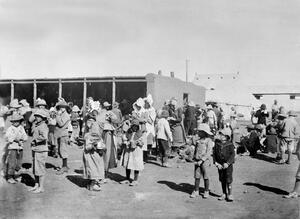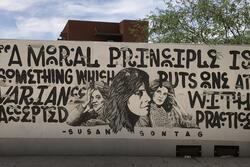A Concentration Camp By Any Other Name
In my house we say “Never again… and again… and again.” We do this because the well known adage “Never again”—which invokes the Holocaust—has wildly failed. Since the Holocaust, we have seen genocides in Cambodia, Argentinia, Guatemala, Bosnia, Rwanda, Darfur, Syria, Yemen, and elsewhere. Still, we sit by and say “Never again.” Now is the time to live that motto into action.
As someone with a background in Holocaust and Genocide Studies and as an employee of a Holocaust institution, I am often asked if I think that comparing modern day crises to the Holocaust is helpful or reasonable. I believe it is a double-edged sword. Holocaust comparisons are incredibly useful because they illustrate the severity and urgency of other human rights violations. The Holocaust is perhaps the most widely-taught instance of genocide, and evokes a powerful response. On the other hand, the use of Holocaust anologies implicitly suggests that it is the only instance of genocide worth referencing when considering atrocities today. This thinking marginalizes the experiences of victims that were imprisoned in other concentration camps in other countries throughout history, targeted because of their identities. As the Holocaust’s living memory floats further away, it is true that we are obligated to teach the history of the Holocaust in order to prevent future genocide—hence, “Never again.” But, I believe that we can also pull from more recent examples of human rights violations, and even examples that hit closer to home, to discuss current events. We can think critically about what is happening at the southern border and in the private facilities holding immigrants and refugees in the United States by recognizing similarities between today and WWII-era Germany, as well as other instances of genocide.
In Dan Stone’s Concentration Camps: A Short History, he defines a concentration camp as “an isolated, circumscribed site with fixed structures designed to incarcerate civilians.” That is exactly what we have at our borders. Concentration camps are not exclusive to the Holocaust and do not only refer to Nazi death camps. In truth, concentration camps were used as tools of oppression and genocide long before the Holocaust, and have been used since.
In Cuba, for instance, concentration camps were established in 1896 and 1897 after attacks on the country’s sugar plantations. Roughly half a million people were incarcerated, and 10,000 died from starvation and disease. In the Philippines in 1901 and 1902, General Arthur MacArthur rounded up 300,000 people and held them in camps. Again, nearly 10,000 people died of starvation and disease. In South Africa, the British army established concentration camps in 1900 during the Anglo-Boer War, holding nearly 100,000 people—most of whom died. The list continues, and includes Namibia, Japan, China, The Gulag, Cambodia, Romania, and the Japanses Internment Camps in the United States—to name a few. It’s worth noting that today, as we debate what to call the camps at our border, we’re also still hesitant to call Japanese Internment Camps concentration camps, even though experts recommend we should.
When we worry about defacing the memory of the Holocaust by using controversial, yet accurate language, we obfuscate the real conflict: that horrific human rights violations still continue to crop up all over the world today, including in America. The issue, at its core, is not that Holocaust comparisons exist or are dangerous. The issue is not a question of whether or not we should be outraged by these comparisons. The issue is that there are atrocities being committed by our government today, and yet we are most concerned, wrapped up in, and focused on semantics; euphemizing the camps at our border is an effort to obscure the truth. A concentration camp by any other name is still a concentration camp.
The use of the term concentration camps doesn’t minimize the history of the Holocaust, it honors it. When we say “Never again,” we mean to ensure a future devoid of state-enforced violence that results from hatred, prejudice, and apathy. Acknowledging when those in power are sowing seeds of hatred. “Never again,” the ultimate call for human rights, does not just apply to Americans, or to people who speak the same language that the oppressor does, or to people who look like us, or to those who share our religious beliefs. Human rights apply to every single human being regardless of age, gender, ethnicity, sexual orientation, ability, religion, political view, or otherwise. Period.
So what can we do to help? What can we do to live out the “Never again” call to action? My initial answers are: Protest, donate, vote, and speak out against hate. However, I would encourage you to go further. Respectfully point those who do not believe the facilities on our borders are concentration camps to this list of books and articles:
- Concentration Camps: A Short History by Dan Stone
- One Long Night: A Global History of Concentration Camps by Andrea Pitzer
- Concentration Camps on the Home Front: Japanese Americans in the House of Jim Crow by John Howard
- “The Invention of the Concentration Camp: Cuba, Southern Africa, and the Philippines 1896-1907” by Jonathan Hyslop
- British Concentration Camps: A Brief History from 1900 - 1975 by Simon Webb
- Political Survivors: The Resistance, the Cold War, and the Fight against Concentration Camps after 1945 by Emma Kuby
- “The Concentration Camp in Global Historical Perspective” by Klaus Muhlhahn
The Holocaust, while unprecedented in its numbers, was not a unique event, and markers of hatred like ghettos, concentration camps, and legilized discrimination are still present today. We must continue to educate those around us, so that one day, we can say “Never again” and mean it.









Can it be that I missed a mention of almost 400 years of concentration camps used to “prepare” millions of captive Africans to be shipped to the New World. The virulent anti-Semitism spread by Farrakhan and his followers has been fed by many factors has been fed, I believe, by the media’s lack of focus on our Jewish compatriots who co-founded the NAACP, stood side by side with comrades during America’s civil rights movement, and continue to work around the world to help Africans and other third people . I just was stunned your article didn’t the criminal African “diaspora” . The only difference with the Jewish Holocaust is that their nightmare lasted centuries .l.